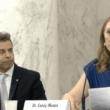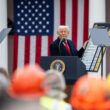The specter of an anti-American Eurasia
May 9, 2018
Six decades before the Russian revolution, Karl Marx wrote prophetically that the ghost of communism haunted Europe. In decades to come, the United States and the world might be haunted by a different specter: an anti-American Eurasia reaching from western Europe to the Pacific coast, encompassing China, Russia, and the Shiite Middle East. The powers along this geostrategic trajectory will have very different singular interests, but they will find common ground in their aspiration to reduce America’s influence.
This vision is perhaps extreme, but it came a step closer to reality when President Donald Trump announced that the United States would walk away from the Joint Comprehensive Plan of Action (JCPOA). With one oversized signature Trump dramatically isolated the United States, pitting it against most of the countries on the map from the Atlantic to the Pacific and then some.
The president did this by brushing off and then uniting in opposition nearly all of America’s allies, at a precarious time when a US leadership vacuum is already encouraging its partners to hedge their bets. This week, for instance, leaders of South Korea and Japan are huddling with China to consider a collective defense against Trump’s overtures toward a trade war. On May 8, Trump threw caution to the winds on an issue with enormous strategic gravity. He did this without an apparent Plan B. The first trial will come when European countries ponder how to defend themselves against renewed US secondary sanctions. They may ultimately challenge the United States’ leadership in global financing governance. Iran will have many cards to play, and it will play them while Washington is preoccupied with the task of limiting damage among its partners in NATO, in the European Union, at the IAEA, in the Nuclear Nonproliferation Treaty, and elsewhere.
Make no mistake: This has not happened because Trump suddenly descended on Washington like a dark meteor. Former Obama administration officials bitterly resent that the JCPOA had became hostage to “Trump’s base.” But the current President’s election was an epiphenomenon that followed from decades of slow-motion cultural, economic, and political decay and disarray in America. This process generated two polarized and increasingly self-referential and intolerant factions that are embroiled in a culture war.
The polarization factored hugely in Trump’s decision to pull out of the Iran nuclear deal. Beginning in 2013, the Obama administration carried out a secret negotiation to put an end to the crisis over the Iranian nuclear program. Republicans fought tooth and nail to deny him congressional support. They also counted on the Pavlovian response of lawmakers who for years had unanimously and repeatedly passed sanctions against Tehran that carried no political risk because the US had no relations with Iran.
Especially in light of uncertain prospects that the JCPOA would lead to desired results and outcomes—rigorous implementation by Iran of a legally-binding International Atomic Energy Agency Additional Protocol, the establishment of a solid verification base line, and détente in the region that included long-term Iranian nuclear restraint—expectations for the JCPOA should have been carefully managed. That didn’t happen. Instead, right off the bat cheerleaders for the Iran deal following negotiators’ optimistic talking points, awarded it an A grade, and naïve and disingenuous demonizers just as promptly gave it an F.
Into this breach the president stepped on May 8. Trump may have Israel and Saudi Arabia on his side. But without the hint of any strategic contingency planning by the White House, it would appear that the United States can expect to pay for the Iran decision in spades—from western Europe to the Pacific, including especially in Iran, where strategic adversaries aiming to pare US influence will seek and may find new opportunities to do so.
Mark Hibbs
senior associate
EXPERT COMMENTARY
Carnegie’s Nuclear Policy Program, based in Bonn and Berlin













